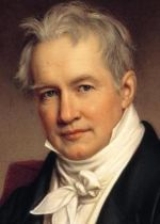
Wilhelm von Humboldt
(1767–1835). Humboldt's quantitative work on botanical
geography
laid the foundation for the field of biogeography
.
Between 1799 and 1804, Humboldt travelled extensively in Latin America, exploring and describing it for the first time in a manner generally considered to be a modern scientific point of view.
Devoted from my earliest youth to the study of nature, feeling with enthusiasm the wild beauties of a country guarded by mountains and shaded by ancient forests, I experienced in my travels, enjoyments which have amply compensated for the privations inseparable from a laborious and often agitated life.
![]()
One of the noblest characteristics which distinguish modern civilization from that of remoter times is, that it has enlarged the mass of our conceptions, rendered us more capable of perceiving the connection between the physical and intellectual world, and thrown a more general interest over objects which heretofore occupied only a few scientific men, because those objects were contemplated separately, and from a narrower point of view.
![]()
The expression of vanity and self-love becomes less offensive, when it retains something of simplicity and frankness.
![]()
Our imagination is struck only by what is great; but the lover of natural philosophy should reflect equally on little things.
![]()
In order to ameliorate without commotion new institutions must be made, as it were, to rise out of those which the barbarism of centuries has consecrated. It will one day seem incredible that until the year 1826 there existed no law in the Great Antilles to prevent the sale of young infants and their separation from their parents, or to prohibit the degrading custom of marking the negroes with a hot iron, merely to enable these human cattle to be more easily recognized.
![]()
The most powerful influence exercised by the Arabs on general natural physics was that directed to the advances of chemistry; a science for which this race created a new era.(...) Besides making laudatory mention of that which we owe to the natural science of the Arabs in both the terrestrial and celestial spheres, we must likewise allude to their contributions in separate paths of intellectual development to the general mass of mathematical science.![]()

